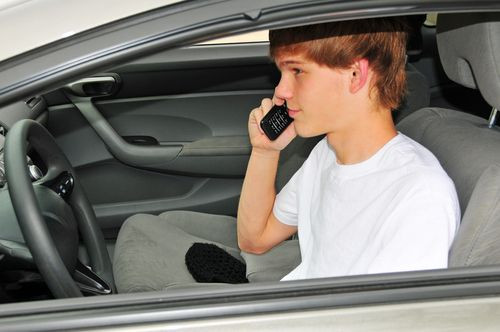Distracted Driving: Teens Get Distracted While Answering Parents’ Call, Leading To Accidents

Teen drivers are considered high-risk, as they are involved in more accidents and traffic-rule violations than any other group. Part of the reason may be that they are distracted while driving. And many a times this distraction will come from the home front itself. New research presented at the American Psychological Association's 122 Annual Convention, states that more than half the teens talking on their cellphones will be in conversation with either of their parents. The research was funded by the National Institutes of Health.
Researchers interviewed or surveyed more than 400 teen drivers from 31 states between the ages of 15 and 18. The teens were asked why despite being aware of the dangers of distracted driving did they continue to text and call while driving. And in their responses, the teens blamed their parents. "Teens said parents expect to be able to reach them, that parents get mad if they don't answer their phone and they have to tell parents where they are," said Noelle LaVoie, PhD, a cognitive psychologist based in Petaluma, California, in a statement.
And while we know babies to be natural copycats, in this case teens seem to emulate their parents in using cell phones while driving. Also, influence by peers cannot be ruled out.
Distracted driving among newly-licensed teen drivers accounts for around 11 percent of fatal crashes, with 21 percent of those involving cellphones, according to a 2013 report by the National Highway Transportation Safety Administration."It's critical to raise awareness among parents and provide teens with tools for communicating with their parents," said study co-author Yi-Ching Lee. The authors also note that there are several apps available to alert people that the person they are trying to contact is driving.
Cellphone use while driving has risen dramatically among teens in the past few years. A 2009 Pew survey found that 43 percent of 16- and 17-year-olds talk and 26 percent text on the cellphone while driving. While a 2013 survey by Liberty Mutual and the nonprofit organization Students Against Destructive Decisions (formerly Students Against Drunk Driving) found that the percentage of 11th- and 12th graders using a cellphone while driving had increased to 86 percent.
In the current study, researchers designed their survey based on in-person interviews with 13 teens, ages 15 to 17, who had learner's permits or driver's licenses. The teens were asked about dangers of unsafe driving including texting and talking on cellphones. Every teen who said he or she talked on the phone while driving talked to parents, while 20 percent said they talked to friends. Among the 395 survey participants, 37 percent of the 15- to 17-year-olds with restricted drivers' licenses and 50 percent of the 18-year-olds with unrestricted licenses said they talked on the phone with a parent while driving. While teens were more likely to send texts to friends while driving, 16 percent of the 18-year-old and 8 percent of 15- to 17-year-old survey participants said they had texted a parent while driving. Besides cellphone usage, other distracting behavior that caused accidents were adjusting controls, personal grooming, and eating and drinking, according to the Foundation for Traffic Safety.
"Parents need to understand that this is not safe and emphasize to their children that it's not normal or acceptable behavior," said LaVoie. "Ask the question, 'Are you driving?' If they are, tell them to call you back or to find a spot to pull over so they can talk."
Source: LaVoie N, Lee C, Is that Mom on the Phone? Teen Drivers and Distraction, American Psychological Association's 122nd Annual Convention, 2014.



























